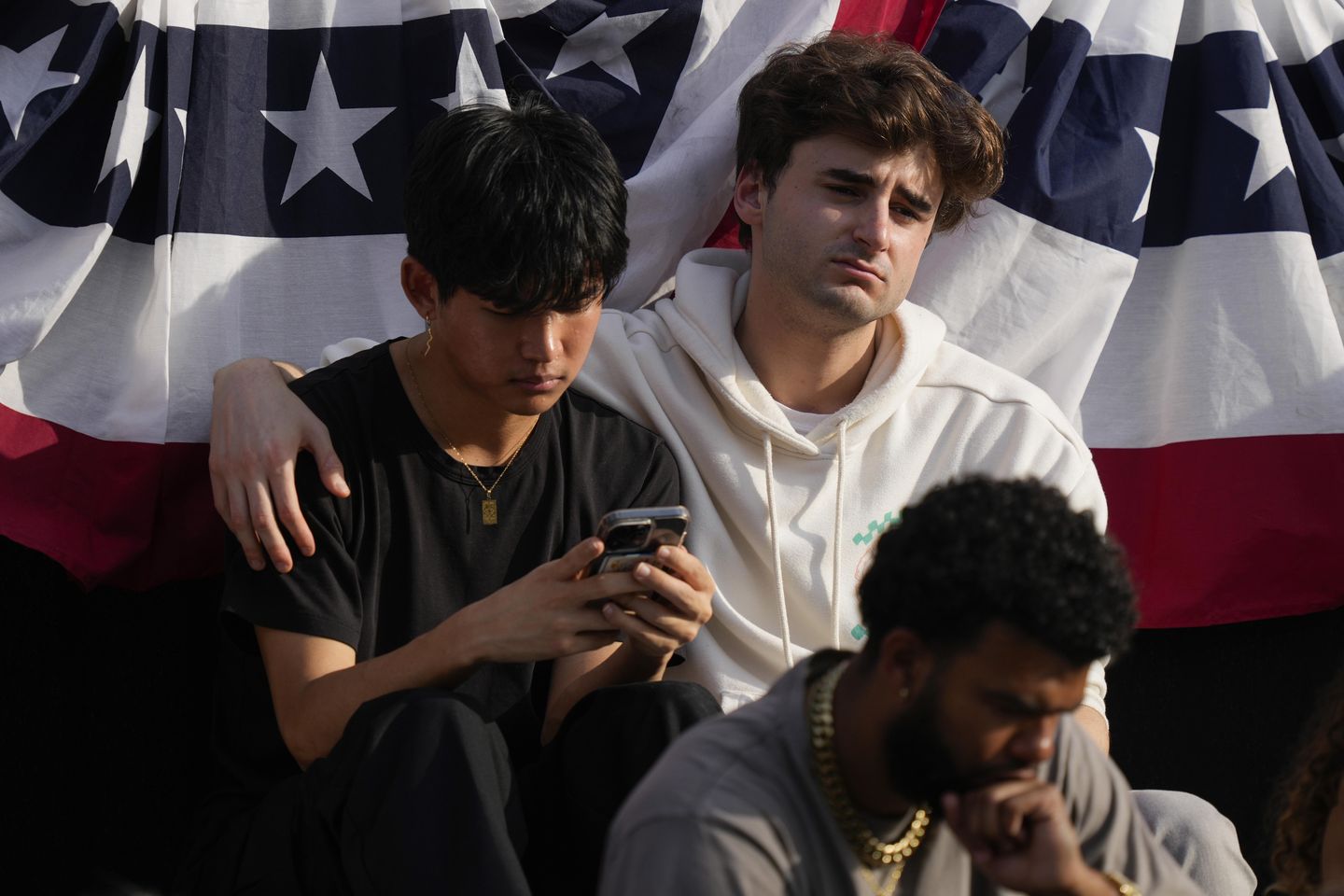OPINION:
Post-election Leftie Meltdowns — widely enjoyed by President-elect Donald Trump supporters — are Exhibit A that many young adults are still tantrum-throwing toddlers inside. But these public displays of angst track with a societal trend: Compared with other nations, American young people — especially liberals — are deeply unhappy.
Every 10 years the World Happiness Report details levels of happiness in 143 nations by asking people where they fit on a ladder with the best possible life being a 10, and the worst possible life being a zero.
Subscribe to have The Washington Times’ Higher Ground delivered to your inbox every Sunday.
The report reveals that Israeli young people — even with all their nation’s troubles — are the second happiest people group in the world (slightly behind Lithuania). American young people, on the other hand, are in 62nd place. Worse, America is one of the few countries where the young are less happy than those of middle or old age. Even Palestinian and Iranian youth are generally more upbeat than their elders.
American youth have lost hope, and they’re down on themselves about it. According to a National Institutes of Health study, “self-derogation” is skyrocketing. The number of American young adults who say that their lives are not very useful is at an all-time high. The young adults who put themselves down the most — by far — are liberal girls, followed by liberal boys.
What explains this decade-long growth in American Gen Z unhappiness? And especially among those who identify as liberal?
SEE ALSO: The new rise of men: Why Gen Z males voted for Trump
Is it COVID? Can’t be. Everyone in the world went through that.
Is it that their government doesn’t offer enough services? No. Young adults from nations lacking in government services regularly score much higher in happiness.
Is it social media use? Possibly. Authorities such as Jonathan Haidt and Jean Twenge extensively document the link between misery and social media usage, as well as smartphone use in general. And yet, the global ubiquity of smartphones does not seem to be making all the world’s youth equally unhappy.
So, what gives? Here’s my theory, based on decades of working with tens of thousands of young people at Summit Ministries: Misery is a product of Loss of Truth times Loss of Hope.
Truth is the conviction that ultimate reality is knowable. Hope is a belief that truth will prevail and that our actions are meaningful. Those who skew liberal are far more likely to reject the notion that truth — reality — is knowable by us. Loss of truth strongly correlates with rising anxiety. Psychiatrist M. Scott Peck observed, “Mental health is an ongoing process of dedication to reality at all costs.” If reality is not knowable, then mental health is not achievable.
Loss of hope multiplies this confusion. Liberal young people, according to Twenge, spend much more time seeking consolation through social media, where they’re frightened into feeling complicit about existential crises over which they have no control. That’s a guaranteed recipe for misery.
Maybe we could learn from Israel. How is it that Israeli youth can — with their compulsory military service (if they’re Jewish) and surrounded by hostile nations on all sides — be so happy?
The answer, according to Dan Senor and Saul Singer, is that Israelis collectively embrace, rather than flee, hardship. They have become antifragile, a term coined by Nassim Taleb to describe those who experience catastrophe and yet somehow come back stronger.
The respected rabbi Jonathan Sacks wrote, “To be a Jew is to be an agent of hope. Every ritual, every command, every syllable of the Jewish story is a protest against escapism, resignation, and the blind acceptance of fate.”
Here’s my message to the young adults I work with at Summit Ministries: You become antifragile through what Adam Alter calls “hardship inoculation.” Intentionally embrace small hardships to toughen yourself. Fast from social media. Exercise. Have an uncomfortable conversation. Take a challenging assignment at work. Serve in your community.
Above all, embrace hope. Optimism doesn’t prepare you for hardship. Hope does. Optimism wishes for what is better; hope seeks what is better. Optimism is passive; hope is active. “Hope never disappoints us,” said the Apostle Paul (Romans 5:5).
Most importantly, hope rejects helplessness. As Henry Wadsworth Longfellow put it in “A Psalm for Life”:
So, let us then be up and doing
With a heart to any fate.
Still achieving, still pursuing,
Learn to labor, and to wait.
–
Dr. Jeff Myers is president of Summit Ministries. As an educator and entrepreneur, Dr. Myers has become one of America’s most respected authorities on youth leadership development. Focus on the Family founder James Dobson referred to him as “a very gifted and inspirational leader.” Evangelist Josh McDowell called him “a man who is 100% sold out to preparing the next generation to reflect the character of Christ in the culture.” Through his speaking engagements and media appearances, Dr. Myers has become a fresh voice offering humor and insight from a Christian worldview. He is the author of 18 books, including the “Understanding the Faith,” “Understanding the Times,” and “Understanding the Culture” textbooks which are studied by tens of thousands of students. Dr. Myers holds a Doctor of Philosophy degree from the University of Denver. He continues to engage college students through an exclusive Signature Leadership Course series offered with Unbound, a project-based education company that prepares high school and college students to become leaders for Christ in the real world. Jeff and his wife Stephanie and their family live in Colorado.
Summit Ministries exists to equip and support rising generations to embrace God’s truth and champion a biblical worldview. Through conferences online, in Colorado and Georgia, and Summit’s gap year semester, tough questions are raised (and answered) and students are equipped to stand firm in their faith. Summit’s worldview curriculum for Christian schools, homeschools, and churches trains the next generation to love God with their hearts and minds. In all of these things, Summit desires to see generations of Christians mobilized to transform a broken world.









